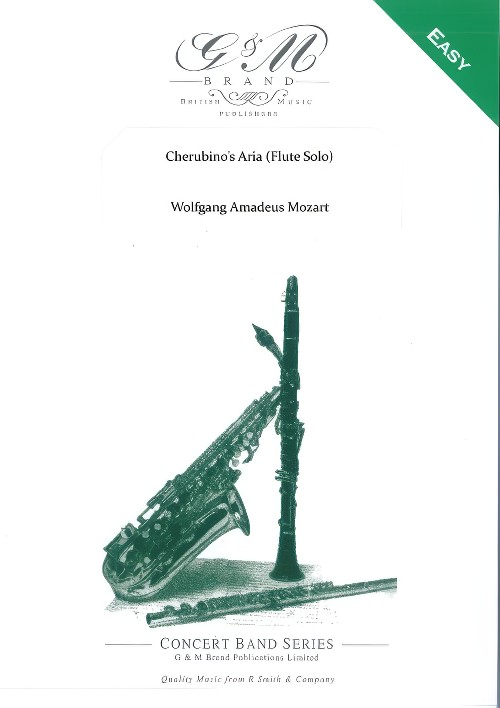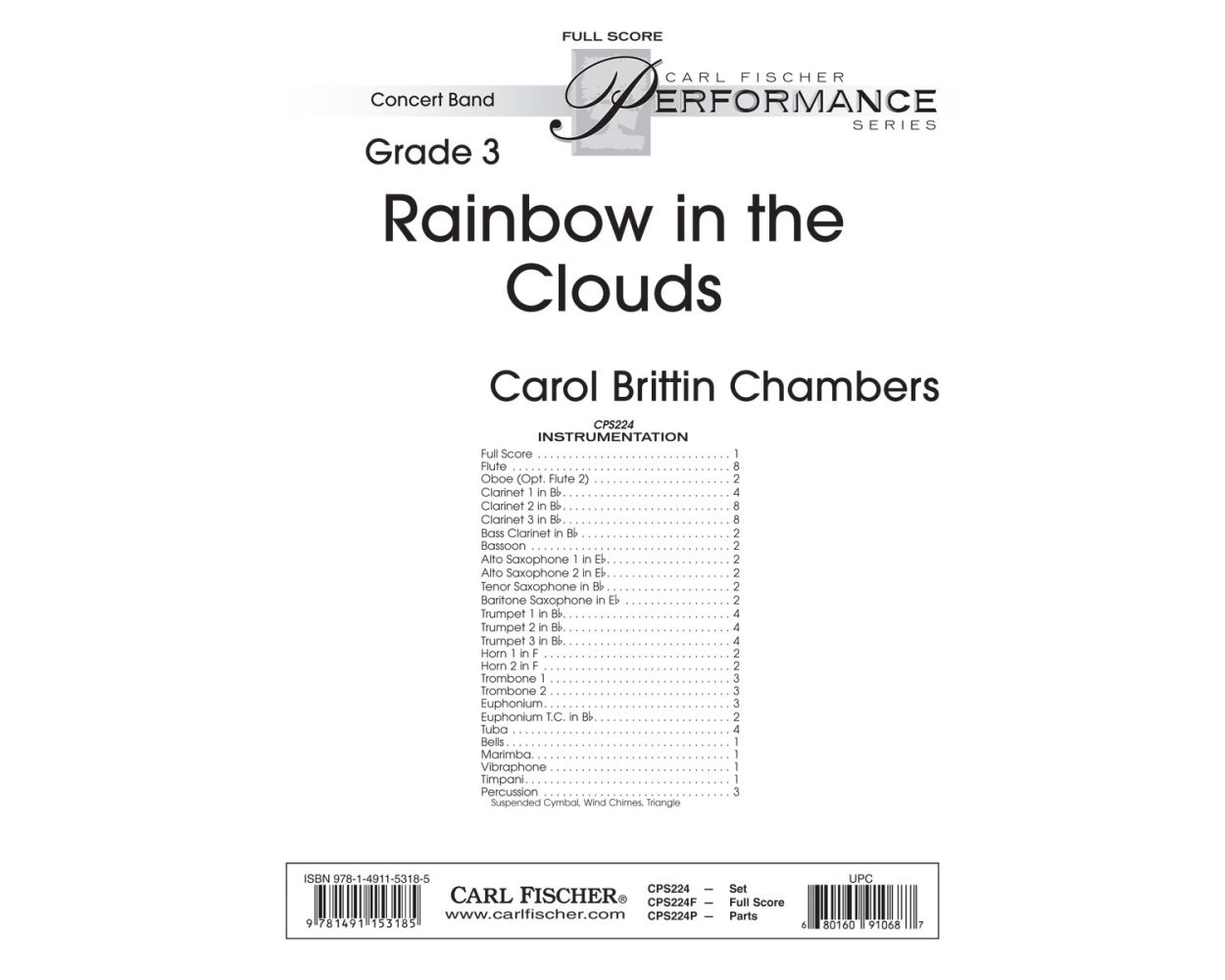Results
-
 £49.95
£49.95Cherubinos Aria (Flute Solo) (Concert Band - Score and Parts) - Mozart, Wolfgang Amadeus - Brand, Geoffrey
This 'Canzona' comes from Mozart's comic opera "The Marriage of Figaro," first performed in Vienna in 1786. Cherubino is a young page in the household of Count Almaviva, although the role is written for a soprano and usually cast for a singer with 'boyish' looks. The song, entitle "Voi che sapete" (Tell me fair ladies), is introduced in the opera as if written by Cherubino himself and is simply a diversion rather than of relevance to the plot. Although initial reaction to "The Marriage of Figaro" was somewhat lukewarm, it has of course established itself as one of the great comic operas, and this canzona became and 18th century "pop" song.
Estimated dispatch 7-14 working days
-
 £9.95
£9.95Cherubinos Aria (Flute Solo) (Concert Band - Score Only) - Mozart, Wolfgang Amadeus - Brand, Geoffrey
This 'Canzona' comes from Mozart's comic opera "The Marriage of Figaro," first performed in Vienna in 1786. Cherubino is a young page in the household of Count Almaviva, although the role is written for a soprano and usually cast for a singer with 'boyish' looks. The song, entitle "Voi che sapete" (Tell me fair ladies), is introduced in the opera as if written by Cherubino himself and is simply a diversion rather than of relevance to the plot. Although initial reaction to "The Marriage of Figaro" was somewhat lukewarm, it has of course established itself as one of the great comic operas, and this canzona became and 18th century "pop" song.
Estimated dispatch 7-14 working days
-
 £84.99
£84.99Als die alte Mutter (Soprano Solo with Concert Band - Score and Parts) - Dvorak, Antonin - Takahashi, Tohru
Als die alte Mutter (Songs My Mother Taught Me) is the fourth of Antonn Dvorak's Gypsy Songs (Opus 55), a cycle he composed in the year 1880. This moving song was written to a German poem by Adolf Heyduk, and in the course of time, it has been performed and recorded by great singers like Nellie Melba, Joan Sutherland and Rene Fleming. The appealing melody is known to a large public. In this edition, two versions have been combined: an instrumental adaptation of the song, and an adaptation for soprano with a concert band accompaniment - both made by Tohru Takahashi.Duration: 2:00
Estimated dispatch 7-14 working days
-
 £84.99
£84.99Nostalgia Wind Band Set (Score & Parts)
In this stunning work French composer Christian Bouthier has created a nostalgic French chanson, a form of song popularised by the ambassador of French song Charles Aznavour. The piece is characterised by a peaceful, moving melody filled with meditative sounds that encourage a blissful dreaminess. 0:03:53
Estimated dispatch 7-14 working days
-
 £89.99
£89.99Turn the Beat Around Wind Band Set (Score & Parts)
In the nineties, the Cuban-American singer Gloria Estefan recorded a sparkling version of Vicki Sue Robinson's disco classic Turn the Beat Around. She gave the song a catchy Latin beat, and with this new impulse, it was a worldwide hit. With the sentence from the song text "Love to hear percussion" in mind, Peter Kleine Schaars incorporated a compelling percussion solo in his arrangement. The result is a dynamic piece of music full of pace and passion. 0:03:27
Estimated dispatch 7-14 working days
-
 £58.95
£58.95TWO SONGS WITHOUT WORDS (Concert Band) - Holst, Gustav - Erickson, Frank
Two Songs Without Words was composed in 1906 and was dedicated to Ralph Vaughan Williams and is similar in style to his two suites for band. The Country Song opens with the principal theme as an unaccompanied clarinet solo, followed by its repetition in the full woodwind section. The main theme returns in a "maestoso" setting before fading into a quite closing. Marching Song is characterized by a distinctive running sixteenth note figure. The principal melody, first played by the low woodwinds, is punctuated by these same running sixteenth note fragments. Both themes are again repeated with much variation before the tempo picks up into a short coda-style ending.
Estimated dispatch 7-14 working days
-
 £64.00
£64.00Armed Services Medley
This updated Armed Services Medley honors the branches of the U.S. military with a collection of service songs, including the recently added Semper Supra (The Space Force Song). The medley allows for flexibility in its performance, with optional percussion interludes and variations in song order. The work offers a chance to honor veterans and their families, creating a patriotic and celebratory atmosphere for any concert.
Estimated dispatch 12-14 working days
-
 £71.00
£71.00Rainbow in the Clouds
Rainbow in the Cloudsis based on a traditional spiritual, possibly an African-American song from the 19th century, entitled God Put a Rainbow in the Clouds. Composer Carol Brittin Chambers was inspired by the poet Maya Angelou to create this setting of the song. With rich and beautiful harmonies throughout, this piece will highlight students' musicianship. This serves as a welcome change of pace on any concert or contest program.
Estimated dispatch 12-14 working days
-
 £94.99
£94.99Beauty of Nature - Jacob de Haan
This attractive work is about the Dutch province of Drenthe, a region where the beauty of nature flourishes. In Beauty of Nature, the composer reminisces about childhood holidays spent here with his parents. From bird sounds, via the regional song of Drenthe, and a children's song to wonderful tutti passages, this is a joyful piece of music for players as well as the audience.
Estimated dispatch 7-14 working days
-
 £127.30
£127.30Mitt hjerte er ditt - Geir Holmsen
"Mitt hjerte er ditt" ("My Heart is Yours") is primarily known with this Norwegian lyrics and melody from Maj Britt Andersen's recording of the song, first released in 1992. Andersen's husband, Geir Holmsen, composed the new music for this recording, a version that has since been performed by numerous other artists, including Anna of the North on "Hver gang vi mtes" in 2022.The lyrics are Alf Prysen's Norwegian translation of Nils Ferlin's Swedish text, originally written to a Swedish folk tune.This is an arrangement written for a vocal soloist and wind orchestra, but it can also be played with instrumental soloists or purely instrumentally. The song has only two verses, so the middle section of this arrangement is an orchestral verse where the melody begins in the lower instruments.
Estimated dispatch 7-14 working days
